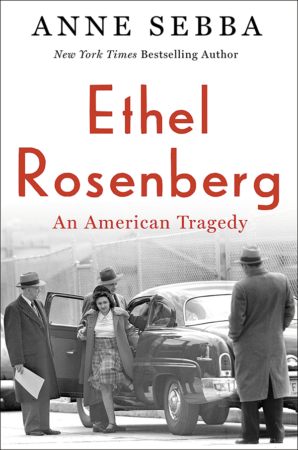OK, you’ll just shut up now.
You won’t say a word. You’re mum, tongue-tied in a knot; you ain’t no stoolie. You’ve zipped your lip for good. As in the new book, ”Ethel Rosenberg: An American Tragedy” by Anne Sebba, you’re not throwing anybody under the bus.
Ethel Greenglass was born in the fall of 1915, and many of her earliest memories were of the lack of love from her mother, who, it’s said, preferred boys to girls. Ethel’s birth was followed by that of two brothers; she doted on the youngest, David, and was like a “surrogate mother” to him.
By many accounts, Ethel was rather plain in appearance but was enormously musically talented and quite acclaimed. In 1934, she auditioned for New York’s Metropolitan Opera, and she taught herself to sight-read music; still, she was prone to stage-jitters. It was during one such “attack of nerves” that she met Julius Rosenberg, and she fell instantly in love.
Activism was one thing the Rosenbergs shared, and they took their commitment to Communism seriously, believing that it would make the world a better place. Ethel’s brother, David, was also a devotee, and he was loud in his views on Communism; this, says Sebba, makes it hard to understand why he was transferred to the site of the development of the atomic bomb while serving in the U.S. military during World War II.
David’s transfer was exactly what Julius needed: he’d gotten involved with Soviet intelligence agents, and David’s proximity to secrets suddenly accelerated Julius’ value to them.
By 1950, the FBI was keenly aware of Julius Rosenberg’s actions, and they believed that Ethel was aware and had perhaps helped. They’d already caught up with David, who was willing to testify against his sister…
You don’t have to stretch much to imagine the anguish this betrayal must’ve caused Ethel Rosenberg; author Anne Sebba paints that particular picture, and that of imprisonment and execution, well. Still, there are a lot of whys and loose ends in this story, including the reason for Rosenberg’s silent loyalty. Then there’s her brother and his end-of-life admittance-not-admittance of lies, the “lethal testimony” of Ethel’s sister-in-law, and the big question of guilt or innocence.
Getting any kind of hypothesis isn’t easy here; while this is a fascinating book, it’s not one you’ll want to skim. Everything you’ll read inside “Ethel Rosenberg: An American Tragedy” is deeply factual and can be surprisingly touching; Sebba tells the story thoroughly, spanning more than a century, and there’s no fat in it. You probably wouldn’t exactly call it entertaining – this is not a thrilling spy story with James-Bondish action – but it is compelling: almost 70 years after her execution, readers and historians finally get a look at the woman Rosenberg was, sans crime, and possibilities to explain her actions.
For anyone who’s unfamiliar or who wants a refresher on the Rosenbergs, this book’s great. Beware that it’s involved; even so, you’ll be captivated by “Ethel Rosenberg: An American Tragedy” from front cover to back until you shut it.
“Ethel Rosenberg: An American Tragedy” by Anne Sebba
c.2021, St. Martin’s Press
$28.99 / $38.99 Canada
320 pages





Leave a Comment
Your email address will not be published. Required fields are marked with *